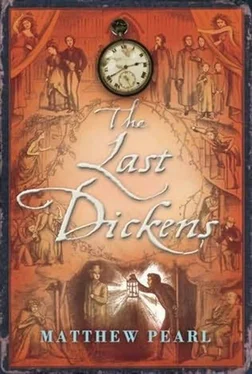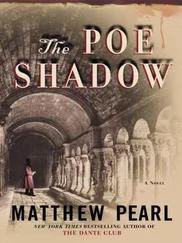“I had lost my boy. Now was I to have my dead brother-however much I despised him-tossed around the columns of the newspapers as his murderer? I would not have been able to bear all of it. I would not have been able to live any longer with the Trood name. Perhaps that is why I have preferred to become of one form with my inn and the picture of the luckless Sir Falstaff. There are reasons murder is not always found out, and they are not always for cunning. The reason might be the fatigue among those who have been deadened on the inside. I buried Eddie quietly right here and told people he had suffered an accident at sea. The workman who had been with me in the excavation vowed to keep the circumstances of the discovery in his confidence, though I knew that would only go so far. Legends and fables sprouted-some told with more truth in them than others. I did not want to hear the stories, but I needed to. There was the story, as I say, that Eddie had stumbled on some kind of opium smuggling operation and was killed because of it. Eddie's terrible end at the hands of Nathan or other fiends became a topic for the Rochester busybodies to stir up.”
“And Mr. Dickens?” asked Osgood eagerly.
“What do you mean?” the landlord asked back blankly
“Why, his final, uncompleted book-surely you realized when you saw the story, even incomplete in serial form…” Osgood did not know how to finish his sentence.
“The name, you mean,” the landlord of the Falstaff interrupted.
“ The Mystery of Edwin Drood. Yes, the name, the plot of the story-did it not strike you as remarkable?”
“Mr. Dickens was a man of genius. In his novels, he'd often employ names and stories he heard for his purposes. Why, just down the road is the old redbrick mansion where ‘Miss Havisham’ lived in her solitary gown as imagined inside his pages, and elsewhere you can ingest beef and beer where Richard Watts did the same courtesy of Mr. Dickens's imagination. I myself had been far too occupied with trying to save the inn to read more than a few installments published of his last work. I had thought to read it all when it was published in its entirety as a book, that is, before the great Mr. Dickens died last month. And when he died, and the state of our inn was put in jeopardy because of it, I could not spare the time. In truth, I have little desire for sensational stories about the tragedy of my son other than the one I own inside. I held his skull in my hands, Mr. Osgood. It was cracked on top. I need to read no more of his death than that story written into my boy's bones!”
AFTER RETURNING to the Falstaff, Osgood immediately arranged to depart for London with Rebecca in order to make further inquiries into the remarkable tale of Edward Trood. This was against the strident orders of Dr. Steele, who Osgood thought might try to place him in a straitjacket to prevent his leaving. Steele warned the publisher that the rheumatic bouts that had plagued him through his youth could return if he did not wait for a full recovery, but Osgood would not change his mind. Osgood also left word with the Falstaff to direct any letters to their new address at the St. James Hotel, Piccadilly, and to send Datchery there at once if he came to call on him.
Osgood, gathering some of his belongings into the hall of the inn, also found himself facing a looking glass for the first time he could remember since his assault. Seeing his reflection, both of his hands involuntarily moved to his face and then slid down his cheeks to his neck as though to hold his head in place. He blinked. Where had the boyish appearance gone, the innocent visage he had always cursed and cherished? In its place was a ghost-pale, almost gaunt countenance, with a complex web of tired lines, crevices, and dark shadows around his eyes. His hair was brittle and flat. He had either crossed toward a premature death mask or from a soft boyhood to a hardened manhood; he could not say which. There was an inspiriting element of his appearance, though. He no longer was inconspicuous or exchangeable with other young Boston Brahmin businessmen. This was James R. Osgood, however battered, there was no mistake about it.
Only then did he realize, confirming a suspicion by walking back into his room, that the looking glass previously there had been removed. He considered whether it could have been the dictatorial Dr. Steele or Rebecca-motivated by control if the former or affection if the latter. He reflected for a moment while standing at the threshold of his room and decided not to ask her about it.
“What about your gift, Mr. Osgood?” It was Rebecca, holding the pink glass tazza from the auction.
“Perhaps we ought to leave it with Mr. Trood to bring to Miss Dickens,” Osgood answered.
“It may be better presented in person. We have an hour before the next train leaves for London.”
“You would not…” Osgood said. “That is to say, you would have no objections to calling on Miss Dickens?”
Rebecca shook her head. “I'd think it a fine idea, Mr. Osgood.”
They went across the road to Gadshill but found it even more desolate than it had been. The front door was open and nobody was there to bring in visitors. Nearly every object was gone now since the Christie's auction. Piles of luggage filled the front corridor and the library. At first, Osgood and Rebecca did not even see Henry Scott, who was curled up in the corner of the library sandwiched between two trunks of clothing weeping. His fine white livery was streaked with tear stains.
“Oh, Mr. Scott, are you all right?” Rebecca asked, kneeling beside him and placing a hand on his shoulder.
Henry tried but failed to speak through his sobbing, communicating in broken syllables like an island savage that they were to leave Gadshill by the morning. Soon, a woman covered in a long black veil, and a flowing black dress with a short jacket with ruffled hem and a grand bustle in the back-mourning in the style of Queen Victoria for her Albert-descended the stairs.
“Other events have delayed my presentation of this, Miss Dickens,” Osgood said to her, holding out the tazza.
“We read in the Telegraph that this sold for seven pounds odd, but it did not say to whom!” Mamie Dickens answered, amazed.
“It did not seem fitting that anyone but you should have it.”
“It is uncommonly kind of you both!” She lifted her veil and wiped her eyes. “Oh, how my sister would laugh at me to see me cry over a little bowl! I shall leave Gadshill tomorrow but shall bring this with me wherever we go in the world.” Putting the tazza back on the mantelpiece, she took one of Osgood's hands and one of Rebecca's.
“I hold my father,” she said softly, “in my heart of hearts as a man apart from all other men, as one apart from all other human beings. I wish never to marry and have to change my name. So I can always be a Dickens. Do you think that so strange, Miss Sand?”
“How lucky you are to have been cherished by a man loved by all the world.”
“Good-bye and God bless you both,” Mamie said, squeezing her visitors’ hands once more.
Aunt Georgy walked in alongside an unexpected man, who bowed coldly at the visitors.
“Dr. Steele!” Osgood said. “I am afraid you shall not persuade me to remain in Rochester.”
“That is not why I am here,” said the doctor coldly.
“Nobody is sick, I hope, Aunt Georgy?” Osgood asked.
“I should have thought you would have been on your way to London already, Mr. Osgood,” Dr. Steele said disapprovingly.
“Dr. Steele has come to settle our bills before we leave,” Georgy said. “I am afraid we haven't had time since… since the good doctor tried everything to revive poor Charles.” With these words, the matron of the house glanced toward the dining room. “Unfortunately, we have not yet received the funds from the auction. I do appreciate Dr. Steele's patience.”
Читать дальше












